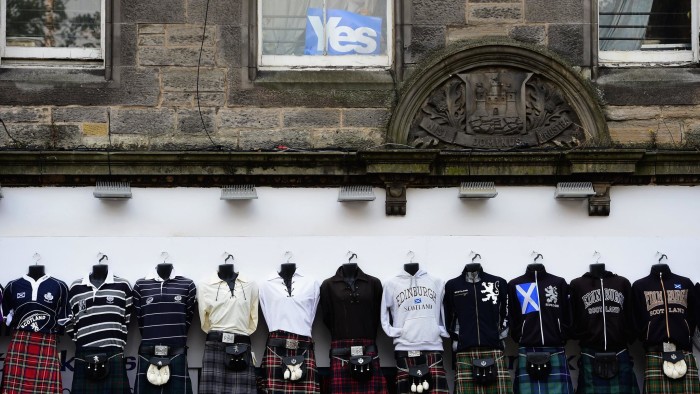Scottish independence: Brown pledges ‘Burns Night declaration’

Roula Khalaf, Editor of the FT, selects her favourite stories in this weekly newsletter.
Scots were promised “modern home rule within the United Kingdom” on a breakneck timetable on Monday if they rejected independence next week, as a new poll confirmed that support for separation was growing.
Gordon Brown, former Labour prime minister, was given the task of trying to halt the independence bandwagon, promising a “Burns Night declaration” on new powers on tax and spending for the Scottish parliament by January.
The promise of new powers for Holyrood came as a TNS poll put the two sides almost neck and neck, with the No side on 39 per cent (down from 45 per cent last month) and Yes on 38 per cent (up from 32 per cent).
Among voters who said they were certain to vote, the two sides were locked at 41 per cent, with 18 per cent undecided.
The surge in support for the Yes campaign continued to weigh on sterling on Tuesday, with the currency falling more than 0.2 cent against the dollar to $1.6065 in Asian trade – its lowest level since last November. It had recovered slightly by late morning in London to trade flat at $1.6106.
On Monday it suffered its biggest fall in more than a year, tumbling 1.1 per cent against both the dollar and euro. It has lost 6 per cent of its value in the past eight weeks.
Alex Salmond, the Scottish first minister and head of the Yes campaign, told reporters on Tuesday during an event at Edinburgh’s Parliament Square that the uncertainty in the pound “could be settled by [Chancellor] George Osborne saying two things”.
“One, that the governor of the Bank of England is in charge, as Mark Carney said. And, secondly, that they will negotiate the sensible common sense agreement for a common currency. That would take any uncertainty out of it whatsoever.”
He added that he was confident of victory but not complacent.
In a last-ditch attempt to seize back the initiative, Mr Brown announced an accelerated timetable intended to secure cross-party agreement on further devolution to Scotland by January 25. “Interestingly enough, by Burns Night,” he said.
Mr Brown said work on the next phase of devolution would start immediately after a No vote. The Scottish National Party would be invited to join unions, churches and other groups in a convention to discuss the new powers to be given to Holyrood.
Speaking at the Miners’ Welfare centre in Loanhead, Mr Brown said he wanted agreement on a draft Scotland Act by January. Ed Miliband, Labour leader, said he would move with “utmost speed” to enact the bill if he won the 2015 general election.
Result too close to call

Prime Minister David Cameron also welcomed the “Labour initiative” and was expected to name the head of the constitutional convention in the coming days as a signal of his support for further devolution.
Mr Salmond has dismissed the latest devolution pledges as a panicky response by a No campaign in chaos.
Yes campaigners say the pro-union parties cannot be trusted to deliver on devolution after a No vote – and that greater control of income tax and some aspects of welfare would, in any case, fall far short of the “job-creating powers” Scotland needs and would gain from independence.
Meanwhile, some English Tory MPs believe that a rapid move to greater devolution would destabilise the British constitution. Mark Field, the MP for the Cities of London and Westminster, said the capital could justifiably start seeking similar fiscal autonomy.
Mr Brown has emerged in recent days as a frontman of the No campaign in Scotland – a role he believed he should have been given in the first place, given his continuing high standing north of the border.
He claimed on Monday that he had been pressing the Tories for some time to set out a tight timetable for delivering further devolution.
On the same day, Mr Cameron signalled he would sign up to the plan, as he turned to his predecessor to help save the union and – perhaps – his job as prime minister.
Comments